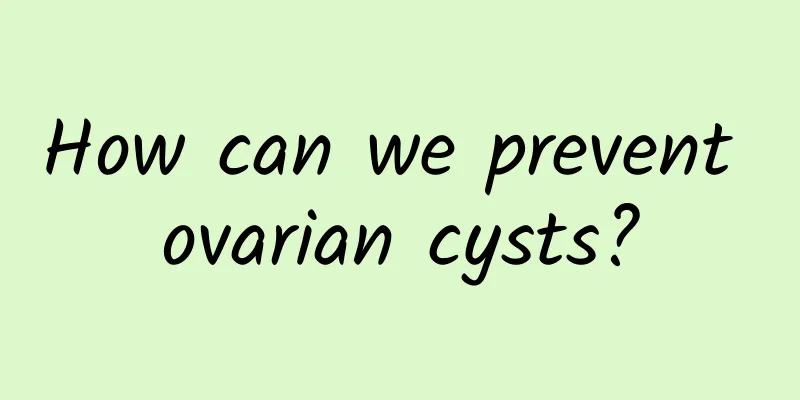What does uterine fibroid nodule mean? What should I do if I have small uterine fibroid nodules?

|
What does uterine fibroid nodule mean? Uterine fibroids are very common benign tumors in the female reproductive organs. They usually appear on the wall of the uterus and are composed of fibroid tissue and smooth muscle. When such fibroids break through the uterine wall and form a nodule, it is called a uterine fibroid nodule. Such nodules are usually localized but may increase or become larger and even cause discomfort and pain symptoms. What should I do if I have small uterine fibroid nodules? When you discover a uterine fibroid nodule, it is important to seek medical attention and advice from your doctor. While most uterine fibroids are benign, they can cause discomfort and pain, and in some cases may require treatment. Doctors will usually perform examinations and blood tests to determine the characteristics and properties of uterine fibroids. In addition, imaging tests such as ultrasound and MRI may also be used. These tests can help doctors understand the size, location, and number of fibroids so that they can develop the best treatment plan. For small and asymptomatic uterine fibroid nodules, doctors often choose to observe and follow up regularly. Because most uterine fibroids grow slowly, it is a safe choice to observe when the symptoms are not obvious or there is no discomfort. However, if the fibroid nodules cause significant discomfort or pain, or if they are interfering with your quality of life, your doctor may recommend treatment. The choice of treatment usually depends on your age, pregnancy plans, and the size and location of the nodules. Medication is one of the most common nonsurgical treatments. Your doctor may recommend hormonal medications, such as oral contraceptives, to control the growth of uterine fibroids and relieve related symptoms. Surgery is also a common option. Depending on the size and location of the fibroids, your doctor may recommend removing the fibroids or removing the entire uterus. Surgery is usually done when symptoms are severe, the nodules are large, or other complications occur. Ending Science Introduction Although uterine fibroid nodules are common in many women, not everyone needs treatment. Each woman's situation is unique, so only a doctor can evaluate and develop the best treatment plan. In addition, although uterine fibroid nodules are usually benign, regular examinations are needed to confirm their status. Regular consultations with your doctor and receiving treatment are important steps to maintain health and prevent complications. In summary, uterine fibroid nodules refer to nodules formed by benign tumors formed by fibrous tissue and smooth muscle on the uterine wall. For small and asymptomatic cases, observation and regular follow-up are common methods. If the symptoms are obvious or affect the quality of life, the doctor may recommend medication or surgery. The most important thing is to seek medical advice in time and have regular checkups to ensure your health. |
<<: What can't you eat after an abortion? How long can you not eat before an abortion?
>>: Why can't you touch cold water after an abortion? Why can't you touch water after an abortion?
Recommend
What factors usually cause vaginitis?
Vaginitis is one of the most common gynecological...
1.8 million metric tons of food waste produced annually! Stack up 1017 Mount Everests
According to statistics, for every 5 mouthfuls of...
There are many symptoms of Trichomonas vaginitis in the vagina
There are many symptoms of trichomoniasis in the ...
Would you feel palpitations if you eat 500 kilograms of American beef? Scholars: 5 kg is excessive
Several non-governmental organizations including ...
What are the correct criteria for diagnosis of candidal vaginitis?
Many women in their daily lives more or less do n...
What is the treatment for bacterial vaginosis?
Bacterial vaginosis causes itching in patients, c...
What do you know about the treatment of vulvar leukoplakia?
What are the treatments for vulvar leukoplakia? W...
Experts explain the causes of irregular menstruation
Irregular menstruation is a gynecological disease...
How to distinguish menstrual blood from miscarriage
How to distinguish between menstrual bleeding and...
How to prevent and treat irregular menstruation?
From the beginning of menarche, you should learn ...
Three common treatments for vulvar leukoplakia
Vulvar leukoplakia is a female disease, and it wi...
Feeling brain fog? Which brain-boosting foods improve memory? Which brain-damaging foods should be avoided?
Do you ever experience brain fog? What foods are ...
Is Mirena useful for adenomyosis?
For patients with adenomyosis, Mirena IUD is an e...
Learn more about the complications of ovarian cysts
Among gynecological diseases, there is a disease ...
Does abnormal yellow leucorrhea affect pregnancy?
Abnormal yellowing of leucorrhea may affect pregn...









